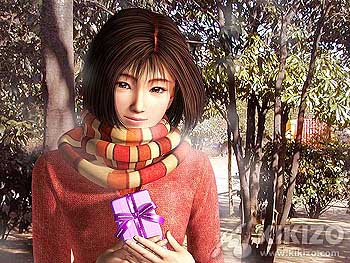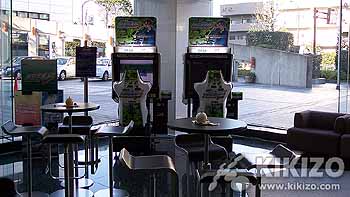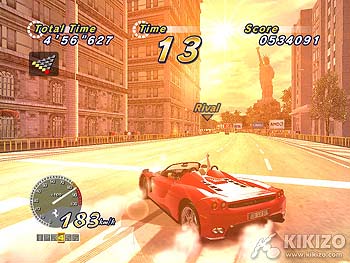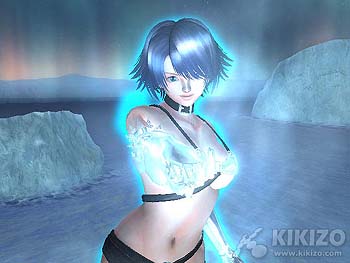Yu Suzuki: The Kikizo Interview (Page 2) (original) (raw)
We spend time with one of gaming's most legendary creators to learn the latest on Psy-Phi and a great untold story about Suzuki learning Hakkyokuken from a grand master. Oh, and some Shenmue stuff too.
Page 2
Kikizo: You've always liked to experiment with new gameplay. While some complained about Shenmue's QTE gameplay feature, they've been proven wrong by its popularity these days in games like God of War and Resident Evil 4. Do you strive to create something new for the sake innovation?
 Could Psy-Phi be suited to DS... or Revolution?
Could Psy-Phi be suited to DS... or Revolution?
YS: There is always a goal set in my mind when I start designing a game. In order to achieve a new concept, I first have to devise a new gameplay system. The QTE system emerged from a need to present the in-game action scenes in a cinematic fashion. I wanted to make the action a little bit easier than, say, Virtua Fighter. As you know, timing is very critical in VF. Shenmue is rather the opposite: it gives the player a bit of extra time to think and react. Even though it's a "Quick Timer Event," it's not really quick [laughs]. It's easy for the player to understand and to make choices. You can use any sort of timing you want.
 Features from Shenmue like QTE have stood test of time
Features from Shenmue like QTE have stood test of time
Kikizo: With that in mind, what are your thoughts on the Nintendo Revolution controller? Do you think you'd like to make a game that would take advantage of the system's unique capabilities?
YS: I quite like it. I think the gameplay experience consists of three different parts: the input device, the gameplay, and the output device. The input is, of course, the means of control. There's a lot of interesting means of input, like the recent EyeToy. The gameplay is how the game program itself responds to and uses the input. The output, then, is the feedback - audio, visual and so on - and the primary output device is always a monitor of some sort. The Revolution's focus is, obviously, the input. It's a new means of controlling the games, and I think it's an important new development.
Kikizo: We have not seen anything from you on console in a long time. Can you give us your thoughts on the next-gen consoles, and the new portable systems, DS and PSP?
YS: They're both nice, and very attractive. It's a pity Sega didn't make them! [laughs]. The DS is an interesting device, and it's mostly focused on games for a younger audience. That's very good. The PSP looks more sleek and stylish, it has a high-quality display, and its audience is older. That's good too. It's just too bad there aren't any games for it! From personal experience, I can say that my kids love the DS. I keep losing to them when we play Puyo Puyo!
 Suzuki prepares for the Kikizo showdown
Suzuki prepares for the Kikizo showdown
As for the consoles, Sony's big point is performance. The CPU, the GPU, the hardware architecture... Microsoft is about usability, like that of a PC. Nintendo is focusing on innovation - the new input device, like we talked about before. I think it's good for the player, since it gives them a lot of options. It wouldn't be interesting if all of the console manufacturers were headed in the same direction.
Kikizo: What are your thoughts on the current arcade market?
YS: The arcade market is declining a bit. A few big companies like Capcom have scaled down development considerably. As a result, we're the strongest in the business now. That's certainly good for Sega. So even though the overall market is shrinking, we're still making a killing. We've got a sixty per cent market share in Japan now, so it's not bad at all for us. Even though the overall market is shrinking, we don't have any real enemies. That's not so bad, is it? [laughs]. Since it is shrinking, though, we've really got to focus on bringing new things to market. No more rapid-fire series of 2 or 3...
 Arcade market: 60 per cent is Sega's, says Suzuki
Arcade market: 60 per cent is Sega's, says Suzuki
Kikizo: There seems to be a trend of nostalgia in the industry at the moment. Two of your most popular games, After Burner and OutRun are popular again and older titles like Space Harrier and Virtua Racing have been re-released. Some say that the increased popularity of old-fashioned games is because modern games have become too complicated. What are your thoughts on this?
YS: It's a matter of personal preference. Some people find tough games to be exciting. Some people like easy games. There have to be both in the market, so that there's something for everyone. Personally, I'd like to have more easy-to-play games.
 The decline is because all the machines are in receptions
The decline is because all the machines are in receptions
Kikizo: The arcade business in the west has been in constant decline. What part can game developers play when it comes to reversing the slump?
YS: We - or another company, perhaps - need to succeed in introducing new concepts. After that has been accomplished, other people can hop on the bandwagon, so to speak. Let's think of arcade machine investments as something like a piggy bank. The operators are able to count a machine's earnings, so they can easily see if bank A is earning more than bank B. Smaller arcades operate much like this.
 More easy-to-play games please, asks Suzuki
More easy-to-play games please, asks Suzuki
In Japan, Sega's arcade management operations started with smaller arcades, then moved up to Sega Worlds in various cities and suburbs, and finally culminated in Tokyo Joypolis. So, I think we also need to move towards the concept of large, more general entertainment centers, with live entertainment and food and such... like Joypolis here in Japan and Gameworks in the US. Kind of like an entertainment shopping mall or supermarket, you know? It should be an unusual, special place in people's minds.

| Video Coverage(Latest Videos & Video FAQ) | |||
|---|---|---|---|
| PLEASE DO NOT DIRECT LINK TO ANY MEDIA FILE ON KIKIZO | |||
| Description | Dur. | Size | Details |
| Shenmue OnlineDirect feed trailer | 2.53min | 33.2MB | SD, 60, DF640x4802Mbps |
| Psy-PhiArcade trailer (hi quality) | 0.36m | 12MB | HD, 60, CAM640x4803Mbps |
| Psy-PhiAs above, normal quality | 0.36m | 6MB | HD, 30, CAM640x4801.5Mbps |
